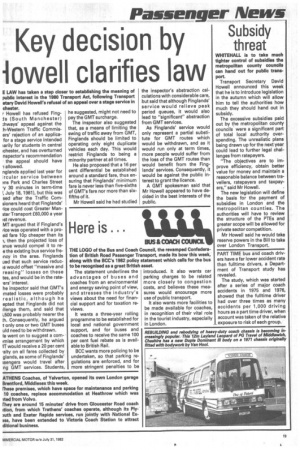Key decision by Iowa clarifies law
Page 15

If you've noticed an error in this article please click here to report it so we can fix it.
E LAW has taken a step closer to establishing the meaning of public interest in the 1980 Transport Act, following Transport etary David Howell's refusal of an appeal over a stage service in chester.
r Howell has refused Fingis (South Manchester) Always' appeal against the h-Western Traffic Commisers' rejection of an applicafor a stage service intended iarily for students in central chester, and has overturned nspector's recommendation the appeal should have allowed.
nglands applied last year for Ircular service between )ns Park and Charles Street y 30 minutes in term-time !, July 18,1981), but this was sed after the Traffic Cornsioners heard that Finglands' 'ice could cost Greater Manster Transport £60,000 a year ist revenue.
MT argued that if Fingland's rice was operated with a proed fare 10p cheaper than its 1, then the projected loss of 3nue would compel it to ree the existing bus service frency in the area. Finglands ued that such service reducis would offset "massive and reasing" losses on these tes, and would be in the rateers' interest.
he inspector said that GMT's mated losses were probably realistic, although he epted that Finglands did not ,Ilenge them, and said that 1,500 was probably nearer the :h. Consequently, he argued t only one or two GMT buses uld need to be withdrawn.
le went on to suggest a cornImise arrangement by which IT would receive a 20 per cent ,alty on all fares collected by glands, as some of Finglands' ;sengers would travel after ng GMT services. Students,
he suggested, might not need to pay the GMT surcharge.
The inspector also suggested that, as a means of limiting the swing of traffic away from GMT, Finglands should be limited to operating only eight duplicate vehicles each day. This would restrict Finglands to being a minority partner at all times.
He also proposed that a 16 per cent differential be established around a standard fare, thus ensuring that Finglands' minimum fare is never less than five-sixths of GMT's fare nor more than sixfifths of it.
Mr Howell said he had studied the inspector's abstraction calculations with considerable care, but said that although Finglands' service would relieve peak period queues, it would also lead to "significant" abstraction from GMT services.
As Finglands' service would only represent a partial substitute for GMT routes which would be withdrawn, and as it would run only at term times, more people would suffer from the loss of the GMT routes than would benefit from the Finglands' services. Consequently, it would be against the public interest to grant the licence.
A GMT spokesman said that Mr Howell appeared to have decided in the best interests of the public.










































